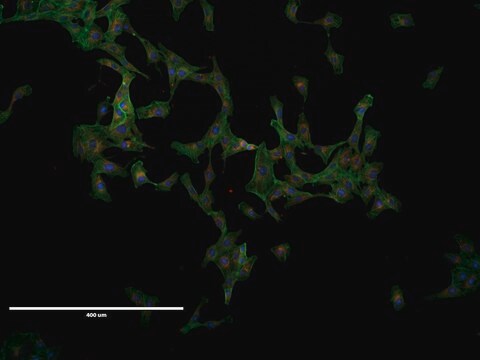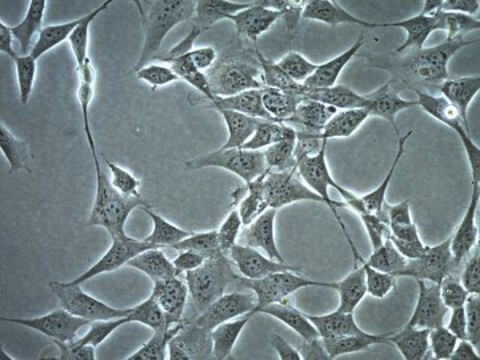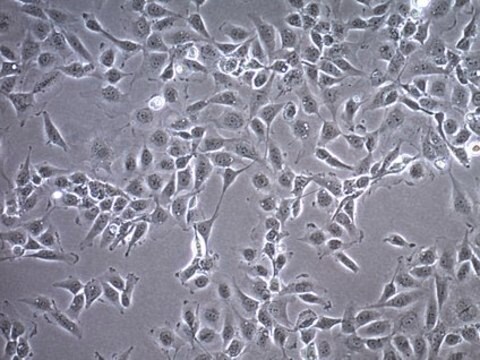SCC280
SCC-61 Human Squamous Cell Carcinoma Cell Line
SCC-61 human squamous cell carcinoma cell line is a good model for studying radiation resistance in SCC cancer cells.
Zaloguj sięWyświetlanie cen organizacyjnych i kontraktowych
About This Item
Kod UNSPSC:
41106514
NACRES:
NA.81
Polecane produkty
Zastosowanie
cell analysis
Opis ogólny
Squamous cell carcinoma of the head and neck (HNSCC) is the 9th-most common cancer worldwide and is characterized by a high rate of recurrence after therapy, with a median 5-year survival range of 40-50% (1). HNSCC tumors show a wide range of heterogeneity in response to radiation therapy. Cellular HNSCC models that demonstrate a range of radiation sensitivity are thus invaluable for elucidating the factors underlying radiation responses of cancer cells.
The SCC-61 HNSCC cell line, derived from an aggressive tongue squamous cell carcinoma (2), is an established model for HNSCC. SCC-61 cells are relatively sensitive to radiation compared to other HNSCC cell lines as well as a relatively stable genome (3). SCC-61 cells grow robustly and are strongly adherent in culture. SCC-61 cells have been characterized by positive expression of the SCC marker p63 (p40) (4). SCC-61 cells have demonstrated utility in studies parsing mechanisms of radio-resistance in SCC tumor cells, as demonstrated by transformation of this cell line with factors conferring radio-resistance (5).
<bold>Source:</bold>
SCC-61 cell line was derived from a tongue squamous cell carcinoma of a male patient (2).
Research Category:
Cancer
The SCC-61 HNSCC cell line, derived from an aggressive tongue squamous cell carcinoma (2), is an established model for HNSCC. SCC-61 cells are relatively sensitive to radiation compared to other HNSCC cell lines as well as a relatively stable genome (3). SCC-61 cells grow robustly and are strongly adherent in culture. SCC-61 cells have been characterized by positive expression of the SCC marker p63 (p40) (4). SCC-61 cells have demonstrated utility in studies parsing mechanisms of radio-resistance in SCC tumor cells, as demonstrated by transformation of this cell line with factors conferring radio-resistance (5).
<bold>Source:</bold>
SCC-61 cell line was derived from a tongue squamous cell carcinoma of a male patient (2).
Research Category:
Cancer
Pochodzenie linii komórkowej
Human, Cancer Cells
Opakowanie
≥1X106 cells/vial
Przechowywanie i stabilność
Store in liquid nitrogen. The cells can be cultured for at least 10 passages after initial thawing without significantly affecting the cell marker expression and functionality.
Inne uwagi
This product is intended for sale and sold solely to academic institutions for internal academic research use per the terms of the “Academic Use Agreement” as detailed in the product documentation. For information regarding any other use, please contact licensing@emdmillipore.com.
Oświadczenie o zrzeczeniu się odpowiedzialności
Unless otherwise stated in our catalog or other company documentation accompanying the product(s), our products are intended for research use only and are not to be used for any other purpose, which includes but is not limited to, unauthorized commercial uses, in vitro diagnostic uses, ex vivo or in vivo therapeutic uses or any type of consumption or application to humans or animals.
Ta strona może zawierać tekst przetłumaczony maszynowo.
Kod klasy składowania
10 - Combustible liquids
Klasa zagrożenia wodnego (WGK)
WGK 1
Temperatura zapłonu (°F)
Not applicable
Temperatura zapłonu (°C)
Not applicable
Certyfikaty analizy (CoA)
Poszukaj Certyfikaty analizy (CoA), wpisując numer partii/serii produktów. Numery serii i partii można znaleźć na etykiecie produktu po słowach „seria” lub „partia”.
Masz już ten produkt?
Dokumenty związane z niedawno zakupionymi produktami zostały zamieszczone w Bibliotece dokumentów.
Nasz zespół naukowców ma doświadczenie we wszystkich obszarach badań, w tym w naukach przyrodniczych, materiałoznawstwie, syntezie chemicznej, chromatografii, analityce i wielu innych dziedzinach.
Skontaktuj się z zespołem ds. pomocy technicznej





